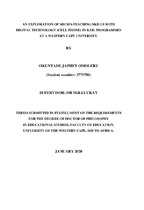| dc.description.abstract | Micro-teaching provides a framework for teachers’ professional development with emphasis on the teach and re-teach cycle as a practical procedure for the development of micro-teaching skills. One fundamental element in this teach and re-teach cycle is the use of digital technology tools as a recording device which may help aid the understanding and application of micro-teaching skills. This study explores micro-teaching skills with the use of digital technology (cell phone) in B.Ed. programmes at a Western Cape university.
The study aims to merge the past and present strategies to initiate the development of a simple model to improve micro-teaching methodology using a simple and mostly available digital technology tool which can allow for self-evaluation and personal reflection. The study seeks to investigate how a digital technology, through a cell phone, can guide practical learning to support pre-service teachers in the micro-teaching presentation.
The underpinning theories that frame this study were Vygotsky’s Socio-cultural Theory, Bandura’s Social Learning Theory and Mishra & Koehler’s Technological Pedagogical Content Knowledge (TPACK) Theory. These theories emphasize social interactions, modelling and the use of technological tools as a significant aspect of skills development. The combination of these theories informs the conceptually developed knowledge acquisition, knowledge construction and the implementation with technology (KACIT) model with the aim to encourage the construction and implementation of micro-teaching knowledge with available digital technology tools.
The study employs a sequential explanatory design, using a case study approach, which draws on both quantitative and qualitative methods as sources of data collection. The quantitative procedure adopted video recording as a form of data collection, using a conceptually developed teaching skills rubric, with a three level Likert-scale rating. SPSS version 25 was used to get the aggregated descriptive statistical values of each teaching skill. The qualitative procedure employed unstructured interviews, lesson plan observation, and thematic and content analysis was used to interpret and analyse the interviews and lesson plans respectively.
The sample size of this study is drawn from the B.Ed. students in the Faculty of Education at the
University of the Western Cape (UWC). Two hundred and sixteen (216) participants were involved
in the quantitative data collection phase, while the qualitative data collection phase consisted of twelve (12) participants for the focus group discussion, five (5) school-based supervisors, five (5) pre-service teachers and (5) five lesson plans from the students-portfolio documents.
The findings attest to the general context of micro-teaching as a strategy for developing pre-service teachers‟ teaching skills. It further highlights the high theoretical knowledge levels of micro-teaching of the B.Ed. students, and the relative lack of practical knowledge of micro-teaching of the students. In addition, the findings reveal the high technological knowledge levels of the participants and the need to deepen the professional knowledge of the B.Ed. students along the lines of authentic teaching experiences within the university environment.
As part of the recommendations, the study emphasises the use of a digital video platform as a complementary strategy and as a form of reflective practice in micro-teaching presentations. Importantly, the study further recommends that the Minimum Requirements for Teacher Education Qualifications (MRTEQ) policy document, on the knowledge mixes for teaching competences in terms of the observation outcome, should be re-considered with a clear guideline for South African universities to have a uniform framework and a clear picture of its implementation. | en_US |

